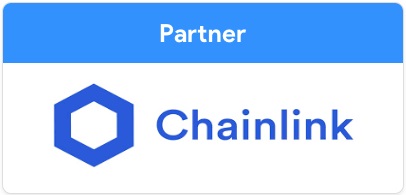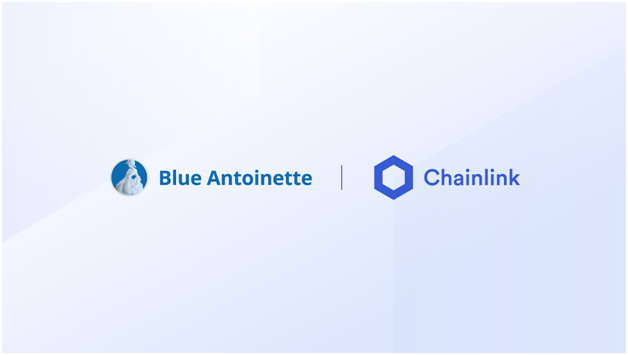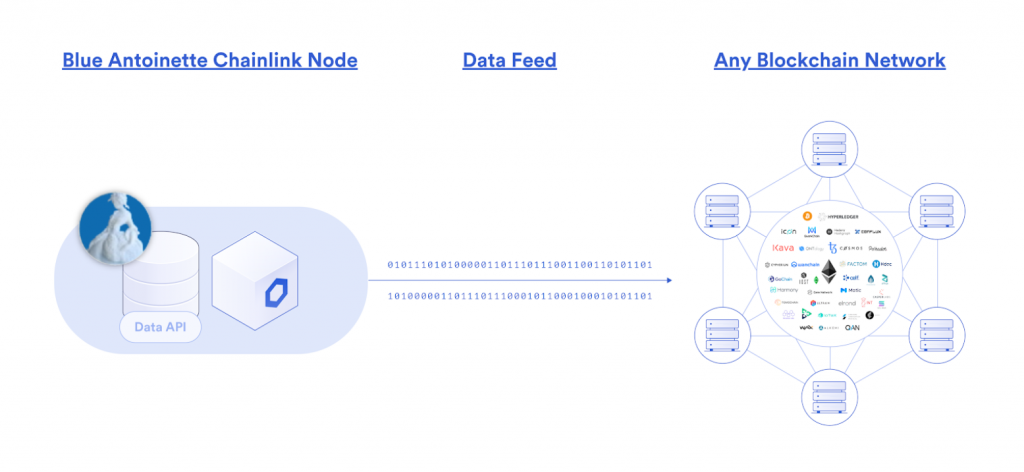Problem Statement:
You want to setup a Chainlink Node quickly with Docker and without paying additional fees for a cloud based Postgres database service, e.g. on on the Google Cloud Platform (GCP)?
Solution:
You can achieve this by running the Chainlink Node itself and also its PostgreSQL database in separate Docker containers.
Watch this YouTube video and see how to setup Chainlink and its PostgreSQL Database with Docker:
With this approach you can save the fees for the database service and you also can save time by utilizing a Container Optimized OS (COS) – Image with Docker already preinstalled.
Follow this 10 steps process to setup the Chainlink Node and its PostgreSQL database with Docker :
- Create a VM instance on the Google Cloud Platform (GCP). Choose a machine type with at least 2GB of memory and change the boot disk from Debian to Container Optimized OS. Then create the instance and SSH into it.
- Create the directories for the Chainlink Database and the Chainlink Node:
mkdir -p chainlink/db mkdir -p chainlink/chainlink_rinkeby
- Create the container for the PostgreSQL database
docker run --name postgres-chainlink -v $HOME/chainlink/db:/var/lib/postgresql/data -e POSTGRES_PASSWORD=myPostgresPW -d -p 5432:5432 postgres:11.12
- Create the chainlink Postgres user in postgres database container:
docker exec -it postgres-chainlink psql -U postgres -c "CREATE USER chainlink WITH PASSWORD 'myChainlinkPW';"
- Create the Chainlink Database (for the Rinkeby test-network in this sample)
docker exec -it postgres-chainlink psql -U postgres -c "CREATE DATABASE "chainlink_rinkeby";"
- Grant the provilieges to the chainlink user
docker exec -it postgres-chainlink psql -U postgres -c "GRANT ALL PRIVILEGES ON DATABASE "chainlink_rinkeby" TO chainlink;"
- Create the .env file for the chainlink node and refer to the required Ethereum network and to our new Postgres Database
vi chainlink/chainlink_rinkeby/.env
and enter
ROOT=/chainlink LOG_LEVEL=debug ETH_CHAIN_ID=4 MIN_OUTGOING_CONFIRMATIONS=2 LINK_CONTRACT_ADDRESS=0x01BE23585060835E02B77ef475b0Cc51aA1e0709 CHAINLINK_TLS_PORT=0 SECURE_COOKIES=false GAS_UPDATER_ENABLED=true ALLOW_ORIGINS=* ETH_URL=wss://rinkeby.infura.io/ws/v3/<YOUR_INFURA_PROJECT_ID> DATABASE_URL=postgresql://chainlink:myChainlinkPW@localhost:5432/chainlink_rinkeby?sslmode=disable
For this demo we use Infura as external provider for the connectivity to the Ethereum blockchain.
If you want to use Infura as well, make sure that you adapt the Infura Project ID accordingly.Also make sure that you use the same Chainlink Postgres password here that you have used to create the Chainlink Postgres User before.
- Create the .password file which holds the password for your node wallet
vi chainlink/chainlink_rinkeby/.password
Enter your password for your node wallet. This password
– must be longer than 12 characters
– must contain at least 3 uppercase characters
– must contain at least 3 numbers
– must contain at least 3 symbols - Create the .api file which holds the credentials for the GUI interface of the node
vi chainlink/chainlink_rinkeby/.api
and enter your email address and password. This password must be 8 to 50 characters.
<YOUR_EMAIL_ADDRESS>
<YOUR_NODE_GUI_PASSWORD> - Now we can create the container for the chainlink node itself
docker run --name chainlink_rinkeby --network host -p 6688:6688 -v $HOME/chainlink/chainlink_rinkeby:/chainlink -it --env-file=$HOME/chainlink/chainlink_rinkeby/.env smartcontract/chainlink:0.10.8 local n -p /chainlink/.password -a /chainlink/.api
Note that we have added “–network host” to the command since we run the database locally from the node’s perspective.
Access the GUI of your new Chainlink node:
- Open a command prompt on our local machine and authenticate with gcloud, in order to be able to access the GUI of your new Chainlink Node
gcloud auth login
Note: Alternatively you can download and authenticate with your API keys
- Create a SSH tunnel for port 6688
gcloud compute ssh instance-1 --project <YOUR_GCP_PROJECT_ID> --zone=<YOUR_GCP_ZONE> -- -L 6688:localhost:6688
Maintenance – How to stop and start your chainlink containers from your VM SSH shell:
Stop and start the PostgresSQL Database container:
docker stop postgres-chainlink
docker start postgres-chainlink
Stop and start the Chainlink Node container:
docker stop chainlink_rinkeby
docker start chainlink_rinkeby (Start and attach: docker start -i chainlink_rinkeby)
Detach from and attach to the Chainlink Node container:
Ctrl-PQ
docker attach chainlink_rinkeby
Need further support or consulting?
Please checkout our Consulting hours.



